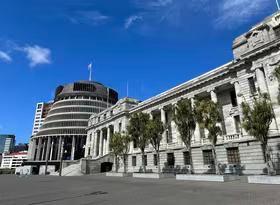Media Release: Economy to bounce back as we learn to live with Delta
Confidence remains that the New Zealand economy can weather the Delta outbreak and bounce back strongly again from lockdown, according to Infometrics’ latest economic forecasts. Infometrics predicts that household spending will once again be in “catch up” mode when alert level restrictions are eventually eased. Business confidence also shows that, overall, firms remain optimistic about a return to normal.
“Job numbers remain high, and people have been saving money during the Delta lockdown,” says Infometrics Chief Forecaster Gareth Kiernan. “That money will eventually be spent, and our experience from last year shows that backing local can get New Zealand’s economy motoring again.”
Nevertheless, the risks of more significant economic fallout mount the longer that restrictions drag on, particularly in Auckland. Hospitality, entertainment, events, and tourism-related businesses are most vulnerable. “The government’s emphasis on raising vaccination rates is important because it recognises the different challenge that Delta provides,” says Mr Kiernan. “Business resilience is being worn down, and every week at Level 3 in Auckland is another week closer to more businesses disappearing, leading to more sustained economic disruption.”
Regardless, the extreme stresses across the economy prior to the Delta lockdown will still be present as demand bounces back. Substantial cost pressures reflect the mix of rampant demand and ongoing disruptions to supply chains and international shipping links. “Workers across the board remain in short supply, and the unemployment rate is set to hold below 4% throughout the next two years. The government’s recently announced 2021 Resident Visa will prevent a big outflow of workers from New Zealand that might otherwise have occurred, but it will not increase the pool of available workers that employers are battling over,” says Mr Kiernan.
Against this backdrop, interest rates have started to rise, with targeted fiscal support now more appropriate than the blanket stimulus offered by low interest rates. Mortgage rates will gradually climb towards 4% over the next year, squeezing discretionary spending and seeing household spending growth slipping below 2%pa later in the forecast period.
Home buyers will also find their ability to pay higher prices for property limited. With debt-to-income restrictions in the mix as well, house prices are set to stabilise within the next year, although prices will still be eye-wateringly expensive.
Infometrics predicts that the economy will grow by 3.6% during 2022, but the most critical piece of this puzzle is how much more certainty about the future can be provided over the next few months.
Key questions remain around how the government will respond if its vaccination targets are not met, what restrictions might remain in place for sectors such as hospitality and events, and how the reopening of international borders will be managed. “Failure by the government to get the timing and scale of New Zealand’s safe reopening to the world right could have long-term consequences for the tourism sector and other business linkages with overseas,” says Mr Kiernan. “Increasing freedom across more countries is turning the focus back on New Zealand’s transition from elimination to how we live with COVID-19, while still protecting citizens and our health system.”
ENDS












